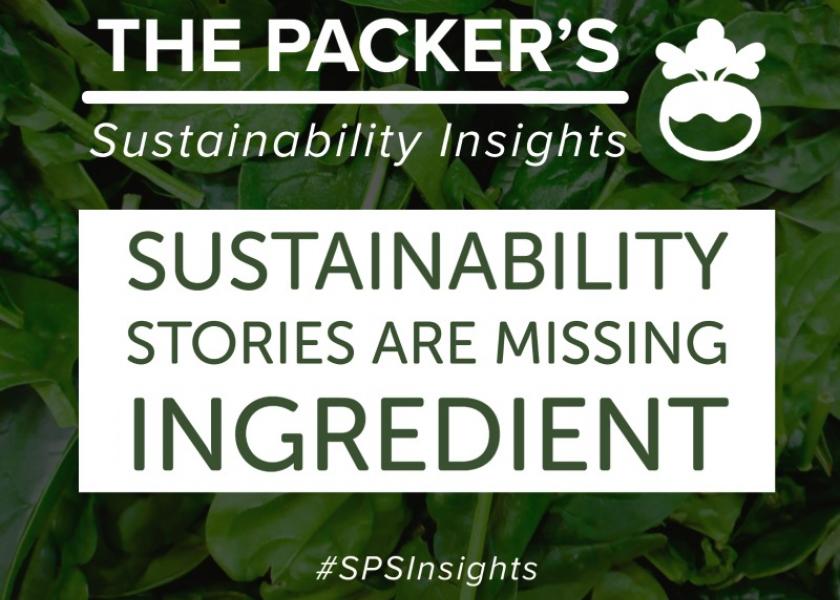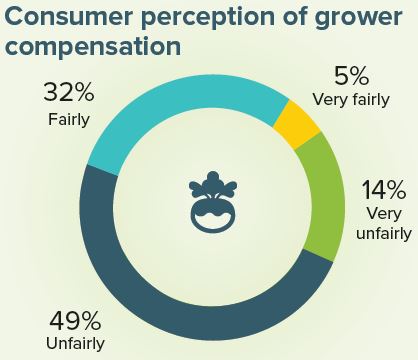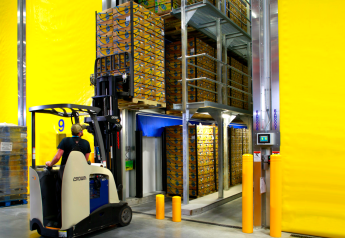Sustainability stories are missing ingredient, researcher says

When it comes to sustainability measures, the tension between growers and consumers is real.
The Packer’s sustainability survey, executed by Aimpoint Research with support by Apeel Sciences and Emerald Packaging, showed contrasting perspectives on sustainability from those who supply food and those who bring it home from the grocery store.
“We have the consumers on one side, the growers on the other side,” said Marcello Sasso, vice president of Aimpoint Research.
Consumers think their demand sets the sustainability agenda, but growers feel they are the ones producing food so they set the rules, he said.
“It’s a very gray area; it feels kind of stuck between two players who are not really able to talk to each other,” he said.
The Packer’s research found that consumers and growers have different perceptions of what defines a product as sustainable. Surveys showed consumers are focused on eco-friendly packaging and growers on local/reduced travel and transparency.
Responding to the question, “Which of the following product features help you define a product as sustainable?” growers and consumers responded this way:
- Eco-friendly packaging: growers, 34%; consumers, 62%;
- Organic: growers, 26%; consumers, 47%;
- Pesticide free: growers, 22%; consumers, 43%;
- Transparency: growers, 61%; consumers, 43%;
- Non-GMO: growers, 23%; consumers, 38%;
- Preservative free: growers, 18%; consumers, 38%;
- Additive free: growers, 19%; consumers, 35%;
- Vegan: growers, 6%; consumers, 23%; and
- None of the above: growers, 6%; consumers, 7%.
Growers feel responsibility for sustainability measures but many are not communicating what they are doing to consumers. The research found that soil testing and crop rotation have been implemented by a majority of growers, while a third are using water conservation practices.
When growers were asked “What sustainable farming practices have you implemented?” and could select all that apply, they responded:
- Soil testing: 86%;
- Crop rotation: 80%;
- Water conservation: 66%;
- Precision ag system: 54%;
- Reduce conventional pesticides: 46%;
- Manual weed control: 44%;
- Reduce conventional fertilizers: 39%;
- Biological fertilizers: 39%;
- Sustainable packaging: 19%;
- Alternative fuels for equipment: 8%;
- Other: 9%;
- None of the above: 0%.
Growers tend feel they will not be fairly compensated for the extra cost associated with meeting sustainability standards.
Read the full Sustainability Inisights publication here.
When growers were asked the question, “Thinking about produce being grown at an extra cost due to a sustainability standard, how do you think the buyers of the produce are compensating producers for the extra cost?” they responded:
- Very fairly: 5%;
- Fairly: 32%;
- Unfairly: 49%;
- Very unfairly: 14%.
Stay up to date on The Packer's Sustainability Insights here.
Telling the story
Part of the element that is missing is the sustainability story, Sasso said.
“My personal assumption is that the whole industry needs something more tangible, to tell a story,” Sasso said.
Not all retailers can effectively deliver a supplier’s sustainability story to consumers. Sasso encouraged growers to engage directly with consumers. That effort, in turn, may prompt retailers and other middle-market operators to step up and “own” a piece of that conversation.
Telling a story about how recycling helps the economy is one example of a strategy, he said.
If marketers don’t tell a “story to justify” higher prices, their sustainability efforts will fall short.
“If there is nothing tangible or there’s no story attached that can make people understand the added value, then of course, (they are) not rewarding you because they don’t understand and see added value.”
Here are a few ways to ensure you never miss The Packer's sustainability content:
Catch up on what you missed at our first Sustainable Produce Summit, including full videos of the keynotes and presentations. Watch here.
Lettuce Learn More is a podcast focused on produce industry education, brought to you by The Packer. Season one of the podcast features educational sessions from the Sustainable Produce Summit. Listen here.









